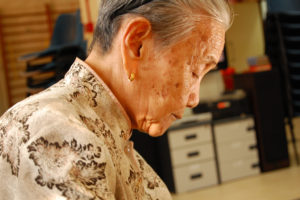
Image belongs to rightful owner.
The article, Why Asian-American Seniors Have High Rates Of Depression But Rarely Seek Help,” written by Kimberly Yam has great detail showing culture differences and how it affects the daily lives of many. I loved how this article was able to snap a reminder into my head about my parents and grandparents. I will be restating some of the things from the article and giving my opinion on the topic.
In the Asian-American community, health is one of the biggest topics that become touchy to talk about, especially with the seniors. Overall health problems are not usually brought up unless one is really needing help; but with mental health many seniors do not seek help for it at all. According to the American Psychological Association, “Asian Americans are almost three times less likely than their white counterparts to seek mental health services.” One of the main factors to this is fear of being shameful. With the Asian culture, pride is very important and that is why some things may not be said or done in order to not “embarrass” the family.
We have to remember that most of our elders have experienced trauma from many of the world and life tragedies that has happened. Adapting to a new place and experiencing the feeling of being separated because of culture and language can have a huge influence on how one may feel. Our seniors/elders in the Asian community may hide their feelings of sadness and loneliness in order to avoid burdening the family. With this, the younger generation of sons, daughters, relatives…etc., should reach out when they feel that there may be some kind of loneliness.
When reading this article, I started thinking about my grandfather. When he was still on this beautiful planet, I met him once when he came to visit my family from Laos. He was one of the sweetest people I have ever met. He smiled a lot and didn’t talk about things much. When we went for walks, he seemed so peaceful. He always stared at the sky and just looked and admired the landscape. Thinking back now, I wish I spent more time showing him many beautiful things in life. I also wish I talked to him more about his past, present, wishes, happiness, and sorrows. Just thinking about how he was when he had visit made me realize that he had a lot of sadness and pain still in him. This realization definitely made think more about checking on my loved ones.
Loneliness and depression can happen to anyone. It may be harder for some to express the fact that they have these feelings. In the Asian culture, admitting that you need help isn’t really a thing. Elders may probably address mental health issues in different ways, like headaches, sleepless nights, pain in the stomach…etc. So it is important for loved ones to ask and spend the time to really try and help.
I am Asian American and when I was reading this article, the descriptions and beliefs about the Asian American culture definitely fit mine. My thoughts and culture may not fit every persons’ but overall, being able to fit and connect to these descriptions and beliefs made me more aware of possible emotions and thoughts my elders may be having. Mental illness is not thought about a lot at all in the Asian community. I hope that my brief article will inspire you to just really look after your loved ones also and remember to be aware of possible symptoms of depression or loneliness.
Read the article by Kimberly Yam at http://www.huffingtonpost.com/entry/asian-american-senior-mental-health_us_591c53eee4b041db8965c58e
This article is definitely worth putting time into reading. I loved everything about it.


